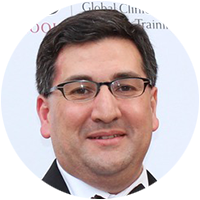Salim Bouguermouh, MD, PhD | Global Clinical Scholars Research Training

Information regarding COVID-19 has rapidly evolved. The content in this article provides a historical snapshot of events surrounding the date of posting.
As Associate Director of Vaccine Clinical Research & Development for Pfizer, Salim Bouguermouh, MD, PhD, oversees clinical research trials on the COVID-19 vaccine—including phase 1, 2, and 3 studies on adults and adolescents. Over the past year, some of these research findings led to U.S. Food and Drug Administration approval of the Pfizer BioNTech vaccine for people ages 16 and up. The BioNTech vaccine was also recently authorized for use in children and adolescents between the ages of 5 and 15. Such efforts are integral to saving lives in the United States and in other countries. But while Dr. Bouguermouh has always been driven to serve others and try to make life better for them, when he first joined Pfizer in 2017, he could not have anticipated that the COVID-19 pandemic would occur, nor that his work would ever play an important role in a crisis of such magnitude.
Dr. Bouguermouh, who was born in Algeria, had been working as a clinician scientist in the immunology field when, seven years ago, he decided to further his training to build on his clinical research and statistics skills so he would be positioned to take on a senior role in the pharmaceutical industry. This led him to apply for the Global Clinical Scholars Research Training (GCSRT) program through Harvard Medical School. He became part of GCSRT’s second class of scholars in 2014. Although the program was still quite new, he was eager to learn from Harvard faculty and to network with colleague-scholars from around the world. In addition, the format, which was a blending of online learning and three intensive workshops, provided flexibility that allowed him to work and learn at the same time. As a result, while attending GCSRT, he was also able to serve as a visiting scientist at the University of Montreal Hospital Research Centre.
Overseeing Vaccine Clinical Trials at Pfizer
Dr. Bouguermouh credits his experience at Harvard, coupled with his work in the field, as truly instrumental in helping him progress his career and ultimately secure his current role at Pfizer. In fact, he points out that many of the skills he gained through GCSRT came into play since he joined Pfizer and were even more critical over the past year and a half as he and his colleagues were conducting clinical trials on the Pfizer BioNTech vaccine amid the stress of the pandemic, with so many people getting ill and dying.
“I had past experience with a clinical research organization and got to see how it all works with the site and running trials,” Dr. Bouguermouh says. But through GCSRT, he points out that he was able to hone his statistical skills, including programming with STATA, to take them to the next level.
“In my role now with the clinical team at Pfizer, we are responsible for overseeing all clinical aspects of the clinical trials. This means that I work with the lead clinician and other people in the vaccine clinical research and development department and other groups to make sure it all goes smoothly,” he says.
This includes designing clinical studies, training the team to conduct the steps, reviewing the data, and interacting with the regulatory agencies.
Finding Common Ground with Colleagues
“We have all different roles, but we have to find common ground to be able to work effectively together, which was a skill I learned through GCSRT,” he stresses. During the worst of the pandemic, he says this was particularly challenging, since all hands were needed on deck and had to know how to work together remotely—often across time zones—to accomplish whatever needed to be done.
In addition, there was the added stress of Pfizer being located in New York, which at one point last year had very high rates of COVID-19, and the hospitals there were overrun with critically ill COVID-19 patients.
“My Pfizer colleagues and I were looking at the New York news every day. On the one hand, we were running a COVID-19 study and vigilant about being rigorous and ethical, and on the other hand, we were thinking about the patients and feeling so anxious to find a solution,” he recalls.
“But when I was thrust into the situation, I realized I had the training from Harvard to rely on and could apply it to help me navigate the logistics. This was so helpful,” he says, adding that he was able to use much of what he learned in real time.
Translating Theory into Real-World Progress
In fact, Dr. Bouguermouh points out that GCSRT really had prepared him well for what was to come.
“During the GCSRT program, the way it had been set up with getting assignments and working together as a team to build on each other’s strengths was a lot like what was happening in the pharmaceutical industry,” he says.
“I also found the statistics helpful in understanding the design of the clinical trial,” he says, since the details were already in place before he got involved.
The Benefits of Advanced Research Training
Dr. Bouguermouh recommends GCSRT for other people who want to accelerate their clinical research careers.
“If you are considering attending GCSRT, think about your background, what you want to accomplish, and what things you are missing,” he says. He also stresses that the program takes a real commitment. Even though much of the work is online, it is very time-intensive and requires dedication. But for those willing to work hard, he says that the rewards—in things like career advancements and opportunities—will certainly be well worth the effort.
Learn more about the Global Clinical Scholars Research Training.
Written by Lisa D. Ellis